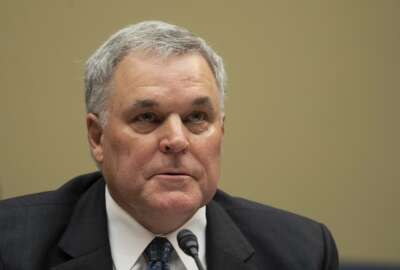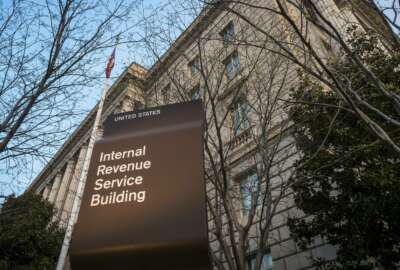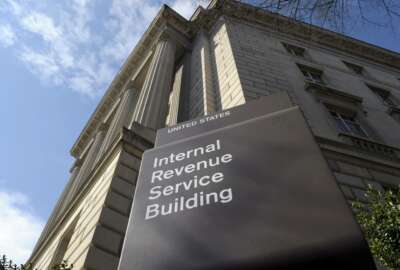IRS seeks authority to fast-track more hires as its builds up depleted workforce
IRS Commissioner Chuck Rettig is urging Congress to give the agency a level of funding that's on par with the Biden administration's budget request, in order to...
IRS Commissioner Chuck Rettig is urging Congress to give the agency a level of funding that’s on par with the Biden administration’s budget request, in order to support long-term investments in its IT and workforce.
Months before the administration released its full budget request, Rettig said the IRS had already developed a workforce plan to shore up significant workforce gaps as soon as Congress approved the spending
“We’ll show you quickly what we intend to do, but we don’t intend to wait six months to implement what we hope Congress provides to us. We’ll be ready,” Rettig told the Senate Finance Committee Tuesday.
Under this plan, Rettig said the agency is looking at three categories of new employees: Early-career hires with about five-to-10 years of experience outside the agency, mid-career and senior hires who can “hit the ground running” as they train up the rest of the workforce.
On the enforcement side of the agency, Rettig said he’s looking to onboard 5,000 employees. The agency currently has 6,500 revenue agents in the field.
Meanwhile, the IRS’s procurement office is also looking to fill 80 vacancies nationwide, mostly for contract specialists.
Rettig is also calling on Congress to expand the IRS’s direct hiring authority to onboard employees with in-demand skills in a matter of weeks, not months.
“Without that direct hiring authority, I cannot keep these people interested in coming on board for [a] three, six or nine-month period. They will go elsewhere, or decide they’re just going to either retire or do what they’re doing. We need to capitalize on the interest that we are able to generate,” he said.
While Congress and the White House have put the IRS in the spotlight over a growing tax gap, Biden’s budget request would give the biggest increase to the IRS’s IT budget and taxpayer services.
“Those two go to helping underserved communities, they go to helping us answer the phones, to getting chatbots, to having it be an experience like people would have been dealing with the private sector. We want to be there, the desire is there,” Rettig said.
The administration’s first full budget request would give the IRS $13.2 billion — a more than 10% increase for current levels. The administration also proposes increasing the IRS workforce by a maximum of 15% each year for the next 10 years. The agency, under this plan, would also see its budget increase by about 10% year over year for the same period of time.
Democrats on the committee support the budget proposal. Sen. Elizabeth Warren (D-Mass.) has introduced legislation that would give the IRS $31.5 billion mandatory annual funding to support tax enforcement, modernize IT systems and improve taxpayer services.
“A decade of budget cuts have hollowed out the IRS,” Warren said.
Sen. Ben Cardin (D-Md.) said an increased budget for the IRS would help boost the agency’s capacity, but said the agency will need additional resources to fully recover.
“If you look at the historic decline of support for the Internal Revenue Service, we are just making up for what we should have done in the past. And we still have a long way to go in regards to the resources necessary to efficiently collect the taxes of this country,” Cardin said.
Sen. Rob Portman (R-Ohio) expressed concerns, however, with the IRS’ ability to get new hires trained and up to speed with the work.
“You want smart, effective people at the IRS to work with. Professionalism is important, training [is] important. One of my concerns is you’re asking for a lot of new people, and takes a while to train them up,” Portman said.
Rettig said the IRS will take some time to bring new hires up to speed.
“The people we bring on board — there will be a curve. We will not be as effective initially when we onboard everybody,” he said.
Sen. Mike Crapo (R-Idaho), the committee’s ranking member, pushed back on demand for a significantly larger IRS budget, saying the agency has become more efficient through technology over the past decade. Crapo said IRS gross revenue collections have increased year over year since 2010, culminating with $3.56 trillion in 2019.
Crapo also pushed back against the Biden administration’s plan to give the IRS more third-party reporting from banks and other financial institutions to shrink the tax gap.
“I don’t have a problem with helping the IRS get a stronger ability to focus and specialize in dealing with these wealthy individuals [and] partnerships and corporations who are avoiding tax owed under the law. But I don’t think that Americans would support giving up their access to their own private financial information to the IRS or to any government agency,” Crapo said.
Copyright © 2025 Federal News Network. All rights reserved. This website is not intended for users located within the European Economic Area.
Jory Heckman is a reporter at Federal News Network covering U.S. Postal Service, IRS, big data and technology issues.
Follow @jheckmanWFED






